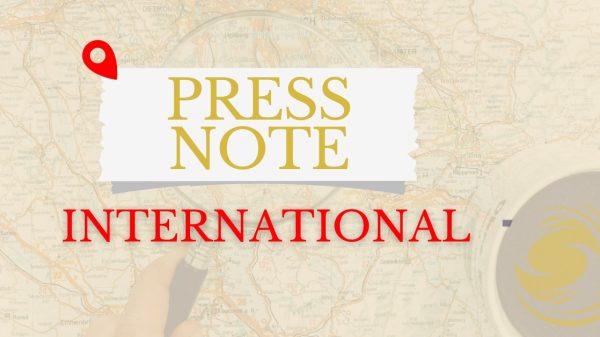Houthi militants vow to escalate Red Sea attacks, threatening global shipping lanes

Hundreds of thousands march across Sydney Harbour Bridge demanding end to Gaza war
The Guardian,
On Sunday, August 3, more than 100,000 demonstrators crossed Sydney’s Harbour Bridge in a massive pro-Palestinian protest, calling for a ceasefire in Gaza and greater humanitarian aid. Despite opposition from some state leaders and initial safety concerns, the rally proceeded in staged segments after police moderated the flow to prevent crowd crushes. Participants included diverse communities, public figures, and activists, many carrying symbolic pots and pans to highlight civilian hunger. Parallel demonstrations occurred in Melbourne, intensifying pressure on Australian politicians over their handling of the Gaza crisis and prompting public debate about the country’s diplomatic posture and protest rights. Weather disruptions and transit delays complicated logistics, but the march remained peaceful.
Russian missile strike and reciprocal drone attacks escalate violence in Russia and Ukraine
BBC,
Early on August 3, southern Ukraine’s city of Mykolaiv was hit by a Russian missile strike that damaged homes and infrastructure, injuring several civilians, while Ukrainian forces launched drone strikes deep into Russian territory, including one that ignited a large fire at an oil depot near Sochi. Russia reported downing dozens of incoming Ukrainian drones and claimed multiple defensive successes, even as Kyiv described continued pressure from Russian aerial assaults across southern regions. The cross-border exchanges mark a continuation of one of the deadliest weeks in months, with both sides trading strikes that further strain ceasefire prospects and deepen humanitarian and infrastructure damage in contested zones.
China’s cyberspace regulator presses Nvidia over alleged ‘backdoor’ risks in H20 AI chips
South China Morning Post,
Beijing’s Cyberspace Administration summoned Nvidia at the end of July to demand explanations and documentation regarding suspected tracking, remote-control, and other “backdoor” vulnerabilities in its newly authorized H20 artificial intelligence chips. The inquiry comes just weeks after U.S. authorities cleared the resumption of H20 exports to China, and amid growing mutual suspicion in the tech rivalry. Nvidia has denied the presence of any hidden access mechanisms, while Chinese state commentary has publicly demanded “convincing security proofs” before full trust can be restored. The scrutiny reflects Beijing’s broader push to assert control over foreign critical technologies and safeguard domestic data sovereignty, potentially slowing planned deployments.
Russia becomes first country to formally recognise Taliban government in Afghanistan
Al Jazeera,
In early July 2025, Russia officially accepted credentials from the Taliban-appointed Afghan ambassador, becoming the first country to grant formal recognition to the de facto Taliban government that took power in 2021. Moscow framed the move as pragmatic cooperation on counterterrorism, security, energy, and infrastructure, with Taliban officials expressing hope the step would encourage other nations to follow. The recognition contrasts sharply with continued Western non-recognition, driven by concerns over the Taliban’s human rights record—particularly restrictions on women’s education and employment. Analysts warn the shift could alter regional diplomatic dynamics and embolden further engagement by countries previously reluctant to formalise ties.
Houthi militants vow to escalate Red Sea attacks, threatening global shipping lanes
Financial Times,
Yemen’s Iran-aligned Houthi movement declared the start of a “fourth phase” of its campaign in late July, pledging to increase attacks on merchant shipping in the Red Sea, including vessels with any perceived ties to Israel. The announcement followed recent successful strikes that sank ships and left crew members detained or missing, exacerbating fears among global trade actors. Shipping firms have rerouted vessels around the Cape of Good Hope to avoid the increasingly volatile corridor, raising costs and delays. The militants’ threat heightens geopolitical tensions, as international coalitions that protect navigation face pressure to recalibrate deterrence while balancing broader regional flashpoints tied to the Gaza conflict.
EU moves forward with AI regulatory enforcement as general-purpose AI rules loom
ITPro,
With the August 2, 2025 enforcement milestone for general-purpose AI (GPAI) models now imminent, the European Union is pressing ahead on its landmark Artificial Intelligence Act implementation. New voluntary but influential governance requirements—framed in the recently released GPAI Code of Practice—mandate transparency, risk assessment, copyright compliance, and documented training processes for major providers such as OpenAI, Google and others. Non-compliance carries significant penalties, including fines up to 7% of global turnover. While some firms have expressed reservations over legal ambiguity, the EU is signalling that the rules will shape global AI governance standards, and early adopters are being urged to align quickly to avoid punitive enforcement.












